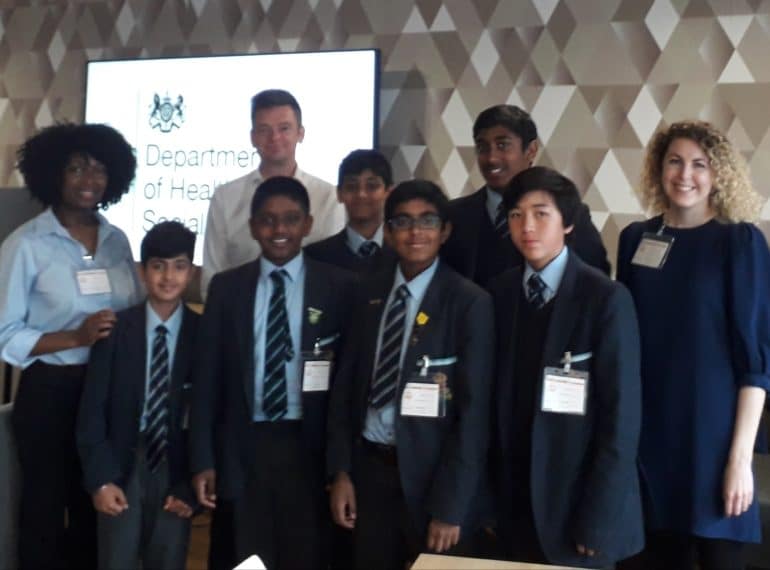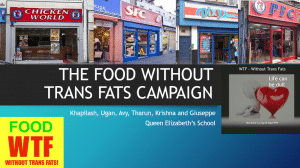
A group of Year 8 boys are on a mission to get national backing for a campaign to regulate the use of trans fats in takeaway food.
 They were inspired to launch their campaign following a presentation by Yinka Thomas, a nutritionist from Barnet Public Health, about the dangers of sugar and trans fats in the modern diet. The boys were so shocked by what they learned that they decided to take action to raise awareness.
They were inspired to launch their campaign following a presentation by Yinka Thomas, a nutritionist from Barnet Public Health, about the dangers of sugar and trans fats in the modern diet. The boys were so shocked by what they learned that they decided to take action to raise awareness.
And their campaign is fast gaining attention in high places: six of the 12 campaigning boys were invited to Whitehall to put their case to the Head of the Government’s Obesity Policy Unit, Richard Sangster.
After seeing their presentation, Mr Sangster told them: “That was the best presentation I’ve heard in a long time and was better than many I’ve heard here at the Department of Health. You showed the dangers of trans fats better than in any public health presentation I’ve seen.” He also commented on the boys’ nuanced arguments, confidence and ability to work together as a team.
The 12 boys began their campaign by writing letters to a number of public bodies, including the British Heart Foundation, the NCD Alliance, the World Heart Federation and the Faculty of Public Health. They then pulled their research together and approached the Department of Health asking for an opportunity to present their findings, and were duly invited in.
They put together a presentation stating the existing health risks of trans fats, which are usually found in partially hydrogenated vegetable oils, and the benefits already seen in countries such as Denmark, which have banned or restricted their use. The Food Without Trans Fat! (Food WTF) team are calling for a mandatory use of healthier alternatives, such as rapeseed oil, for cooking in fast food and takeaway restaurants.
One of the group, Avy Batra, said: “We had not realised that one portion of chips fried in AVR60 – the best-selling partially hydrogenated oil – contains 10g of trans fat. Hundreds of thousands of young people, especially secondary students, are consuming these on a regular basis, either on the way back from school or when they go out with friends, putting themselves at risk of developing heart disease and other serious illnesses in the future.”
Head of Year 8, Rosie Hall, who accompanied the group to the Department of Health, along with Ms Thomas, said: “The boys delivered an engaging and convincing argument about the dangers of trans fats, particularly AVR60 in fast foods. They took props to show how much fat was going into a person’s body if they ate two bags of chips every week, something which many school pupils and young people do.”
Mr Sangster, who was the lead author of the Government Childhood Obesity Policy published last year, discussed with the boys the paucity of data on the consumption of trans fats. While he was unable to offer any funding for their campaign, he was happy to back the campaign’s message.
Mr Sangster also mentioned the National Food Strategy (NFS) being put together by the Department for Environment, Food and Rural Affairs (DEFRA). The boys’ next step will be to try to arrange a meeting with Henry Dimbleby, who is leading the NFS as the lead non-executive board member of DEFRA.
Ms Thomas, who met with the team several times to give them additional information and advice, said: “I was so impressed with the boys’ presentation. They should be so proud of their achievement – and hopefully energised going forward.”
The six boys who presented their findings to Mr Sangster were Avy Batra, Giuseppe Cipponeri ,Tharun Dhamodharan, Ugan Pretheshan, Krishna Shrivastava and Khapilash Sritharan. The remaining team members are Theo Abraham, Rayan Choudhury, Omar Siddick, Siddharth Sridhar, Kevin Sureshkumar and Dharun Thambiayah.
